Accessible Nature in York and Berks Counties
Story and photos by Cindy Ross Fall 2024
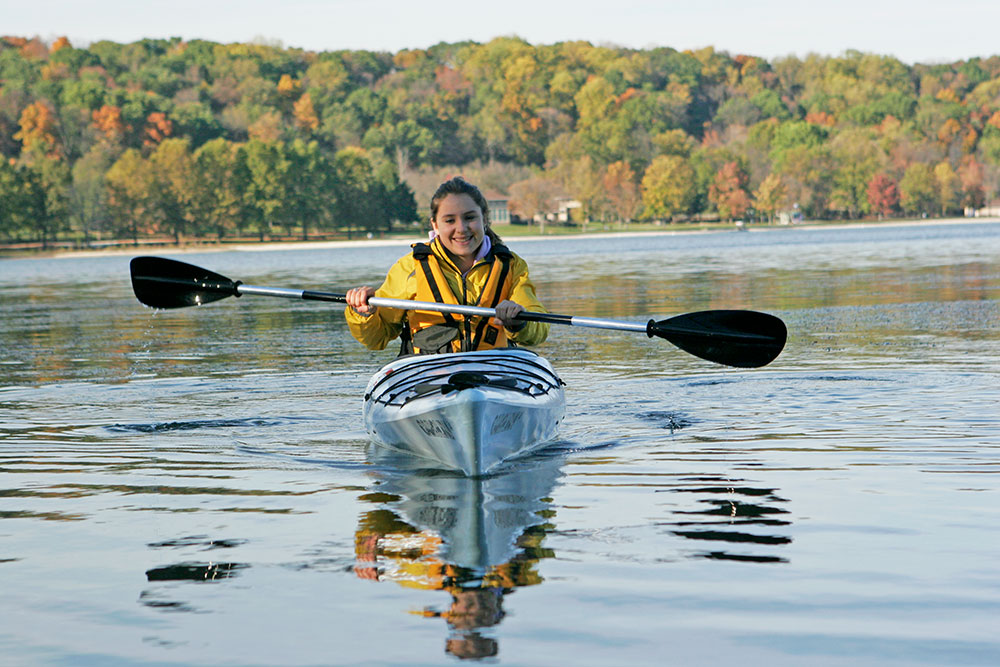
Kayaking at Gifford Pinchot State Park
ACCESSIBLE PADDLING
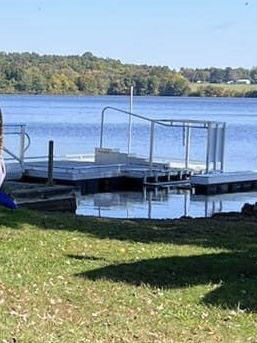
Adaptive Kayak, canoe and boat launch.
It’s a little frightening for a disabled person like my husband, Todd Gladfelter, to leave the security of his wheelchair and launch onto a lake in a boat, but the accessible launch at Gifford Pinchot State Park, York County, can make this happen. There are descending blocks to bump down to the aluminum shoot, where your boat sits cradled. You pull out the sliding seat, grab onto the overhead loops, lower into the boat, and, with total stability, push out onto the water. Then, the magic of the natural world and the lake begin to seep into your soul.
My husband grew up in York and fondly remembers this place the most out of all of his childhood memories. His parents frequently brought him and his siblings here while they were growing up. They swam in the 340-acre Pinchot Lake, on which we float, picnicked, camped, and hiked the trails, but that was long before Todd was in a wheelchair.
A few years ago, my very athletic, adventurous husband suffered a devastating fall, which broke his neck and resulted in an incomplete spinal cord injury. Since then, we have not been content with a life indoors, away from the beauty of nature, its calming peace, and many health benefits. We have come to Gifford Pinchot State Park because it recently added this amazing accessible launch (above), allowing the disabled and everyone else an easy way to get onto the lake. Park officials also added two new beach wheelchairs to help the disabled enjoy the beach by navigating through sand and water. Mobi-Mats—portable and removable rollout beach access mats—have also been installed, providing a firm, safe, and stable surface for the beach and lake to experience some much-needed adventure. Adventure can be defined as “an activity that is unusual and exciting, especially the exploration of unknown territory.” Adventure is not something you’d normally associate with folks with mobility challenges. But they, too, need to get outdoors in nature and find a little excitement in their often confined, predictable lives.
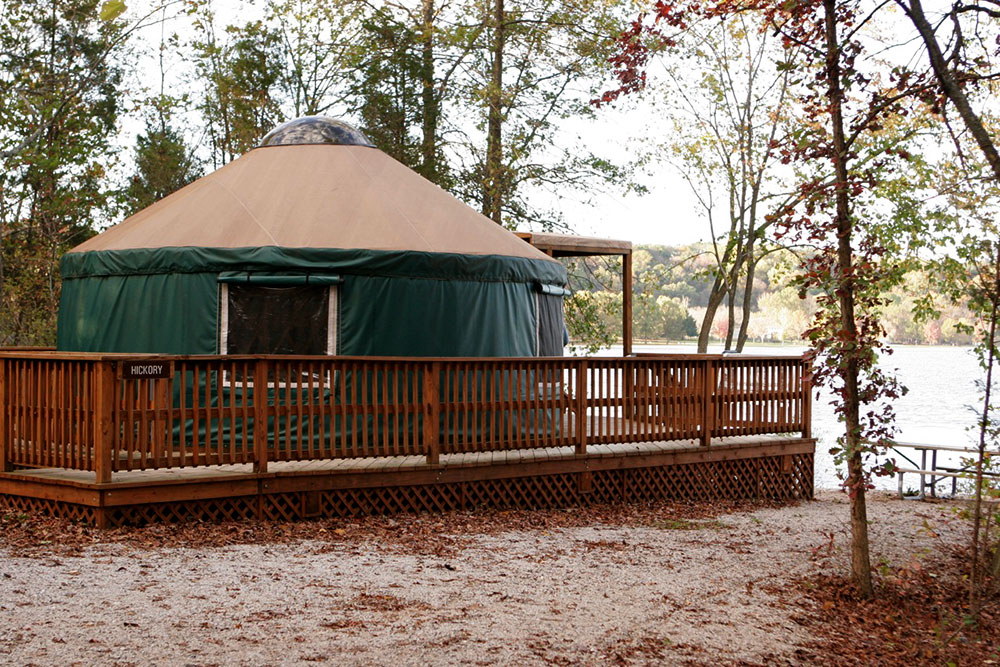
Accessible Yurt at Gifford Pinchot State Park, York County.
Tonight, we’re going to up that excitement even more by camping in the accessible yurt here at the state park. A yurt is a round hut traditionally used by Mongolian nomads in the desert. Today’s modern version uses wood and canvas, a cross between a cabin and a tent. Fourteen state parks in our Pennsylvania state park system now offer a total of 34 yurts.
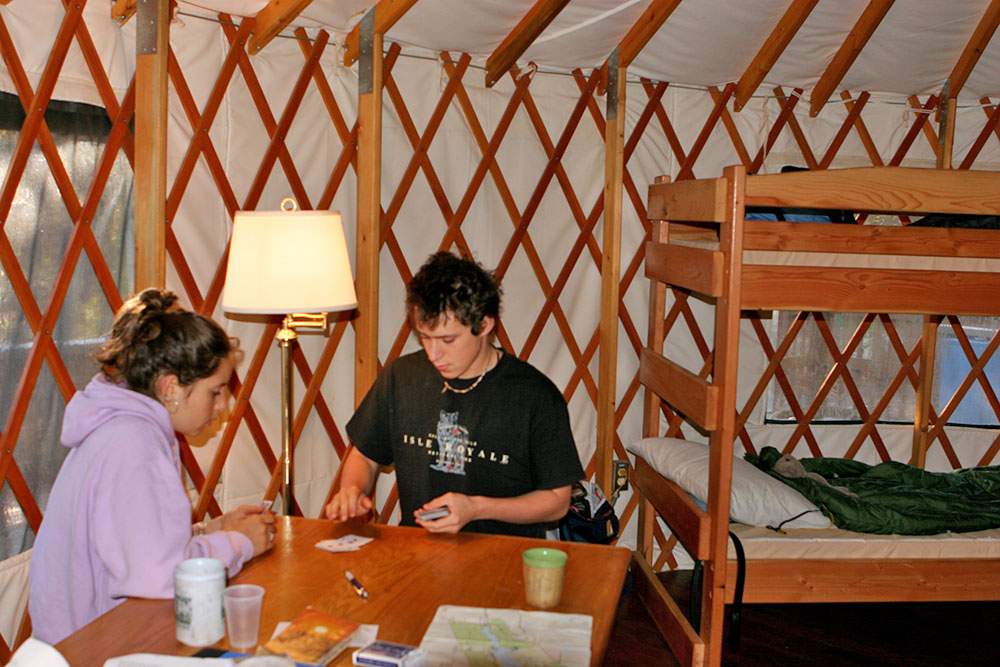
Yurt interior.
A long wooden ramp and deck surround the yurt, making it wheelchair accessible. It sleeps six comfortably and is equipped with a full-size refrigerator and stove. There is even a thermostat for electric heat. The only creature comforts missing are running water and a bathroom, but the heated public bathhouse nearby easily takes care of those needs.
We are impressed with the fine quality of household features like hardwood floors and beds, brass lighting, floor lamps, and a solid oak dining table and chairs. The criss-cross wooden latticework, which holds the yurt in place, and the geometric lines of the roof radiating like the spokes of a wheel create an interior that is very pleasing to the eye. It is a lovely place to hang out, resting after our day outdoors.
One in four Americans live with a disability (61 million), which keeps them at home (1 million require a wheelchair) where they are more comfortable and their lives are safe and have a degree of accessibility. But a life indoors, surrounded by screens and technology, robs you of the beauty and wonder of the natural world. Studies in recent years have found that ecotherapy, simply spending time in nature, actually helps and heals you, be you a disabled person or a stressed-out human who needs a break. Scientific research suggests that the human brain craves green environments and wild places. Being in nature helps shift the brain to the relaxed, calm, focused electrical brainwave pattern- alpha waves, which helps rewire the brain. Spending time in forests and green natural areas significantly lowers your pulse, blood pressure, and sympathetic nerve activity (the flight-or-fight response). We all need time in nature, and people with disabilities are no exception.
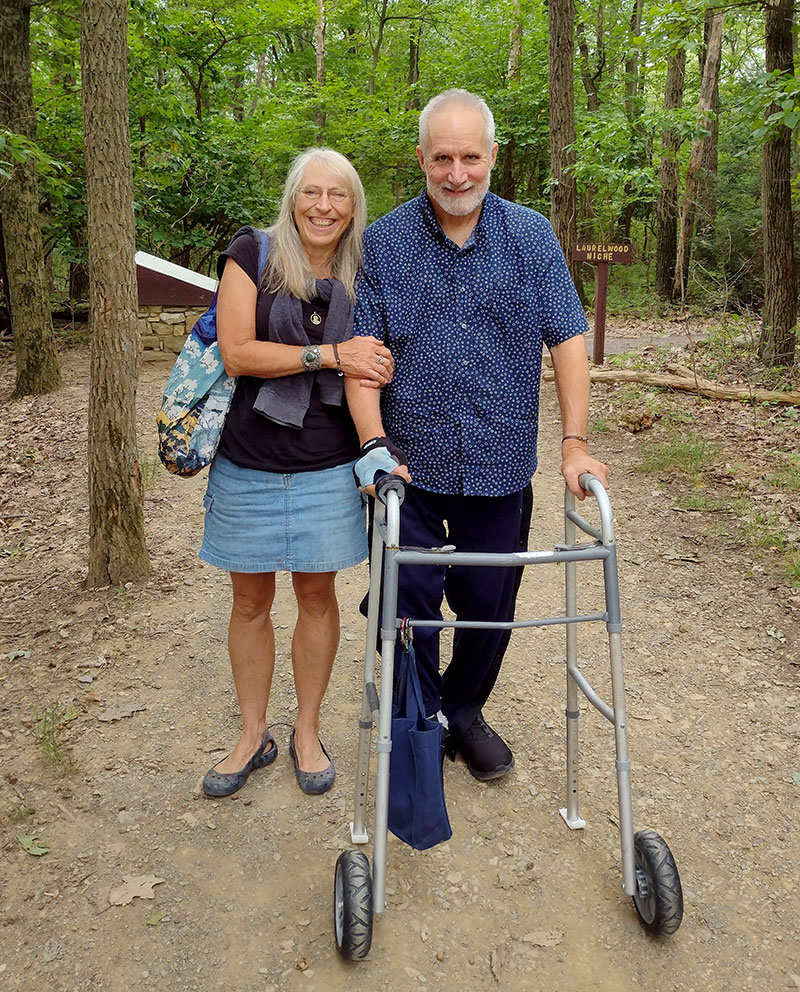
Cindy and Todd at Hawk Mountain in Kempton, Berks Co.
ACCESSIBLE TRAIL
Another local treasure for the disabled is the accessible Silhouette Trail at the world-class, private Hawk Mountain Sanctuary for migrating birds, in Kempton, Berks County. The 6-foot-wide, 900-foot-long trail to the South Lookout has a grade of less than 8.3 %. This semi-smooth surface of pressed pebbles has nine benches, with pull bars in the middle, positioned at least 100 feet apart. South Lookout has a large, smooth, flat area for viewing with a bench, which can easily accommodate many wheelchairs.
When Todd became injured, we visited the nearby sanctuary often. He first motored up to South Lookout in his power chair for a picnic dinner to watch the sunset and the full moon rise. As time went by, with intensive physical therapy and incredibly hard work, Todd began using a walker. He practiced walking using the benches on the adaptive trail as a goal until the first day of spring in 2022. Just fifteen months after he became paralyzed, Todd walked all the way to South Lookout and back.
Besides being a local nature destination for us, Todd has a close connection to the sanctuary as he carved the upright log posts at the sanctuary’s new amphitheater. Thirty-two species of North American wildlife are beautifully carved in the upright log posts. A wheelchair or walker can easily fit between the benches and make not only viewing the magnificently-carved eagles, hawks, bears, whitetail deer, bobcats, etc., possible for those with limited mobility but also enjoy the concerts and talks HMS offers to the public.
At the time, Todd wasn’t thinking about how accessible the space would be for people with disabilities because he never dreamed he would be in a wheelchair at such a young age. The amphitheater was completed in 2020, only one short year before Todd’s fatal fall. Now, Todd visits the amphitheater for concerts and talks and appreciates his ability to move around freely. The Native Plant Garden is accessible, and a short loop takes you to a viewing deck over a small pond.
The life of a disabled person can feel very small and limited, besides enormously challenging and difficult. That goes for the caregivers, too- the quiet, unsung, tired heroes holding it all together. Spending time in the natural world can fill all of our lives with so much joy and a feeling of great peace. We can forget life’s hardships and feel connected to a larger, more beautiful world.

SHARE
PRINT